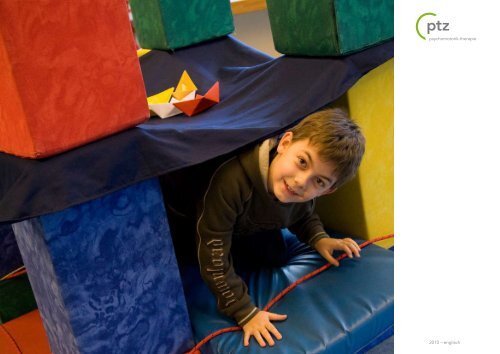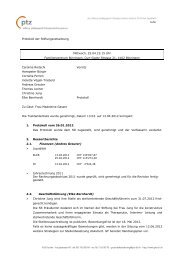psychomotorik-therapie 2010 – englisch
psychomotorik-therapie 2010 – englisch
psychomotorik-therapie 2010 – englisch
- TAGS
- englisch
- www.ptz-bl.ch
Create successful ePaper yourself
Turn your PDF publications into a flip-book with our unique Google optimized e-Paper software.
<strong>psychomotorik</strong>-<strong>therapie</strong><br />
<strong>2010</strong> <strong>–</strong> <strong>englisch</strong>
Psychomotor Therapy (PMT)<br />
Sometimes, children display unusual motor mannerisms. This will restrict their<br />
movement and their powers of expression and learning. Some children find it difficult<br />
to plan and execute sequences of action. For some children it is also harder<br />
to form adequate day-to-day relationships.<br />
Psychomotor Therapy is a pedagogical-therapeutic service for children who are<br />
unusual in their development.<br />
A careful psychomotor assessment can provide clarity when your child displays<br />
unusual behavior:<br />
balance abnormalities and unusual movement coordination<br />
difficulties when it comes to making or building things, drawing, writing<br />
short attention and concentration span<br />
low self-esteem, anxious, self-conscious or infantile behavior<br />
difficulties in their dealings with other children<br />
agitation, disruptive behavior, difficulties with sticking to rules<br />
Psychomotor assessment: observation and discussions<br />
The psychomotor assessment includes observing the child in free and structured<br />
play and movement, but also talking to the child, parents and other attachment<br />
figures. In the case of writing problems or if the child is unsure whether it is right<br />
or left-handed, a special assessment will be carried out.<br />
Based on the results of the assessment, we will decide, together with the parents,<br />
whether therapeutic support is advisable.<br />
The child will be supported in the following areas:<br />
independence and self-determined activity<br />
increasing self-confidence<br />
discovering and developing personal skills and strengths<br />
developing competence in the area of gross, fine and graphomotor skills<br />
developing sensory perception and body consciousness<br />
developing new strategies and possible solutions for dealing with problems,<br />
activities and material<br />
improving social competence and communication skills<br />
Psychomotor Therapy: playing, expressing, processing<br />
Psychomotor therapy is based on the child’s personal developmental issues, its<br />
individual play and movement behavior, its strengths and its set of experiences.<br />
In psychomotor therapy, we work with stimulating movements: in play, with music,<br />
specific materials and artistic means of expression. The child is thus able to get to<br />
know its abilities and limits in a protected environment. It develops its skills and<br />
learns to deal with its difficulties.<br />
Through movement and symbolic play, the child learns to express and process its<br />
experiences, emotions and conflicts.<br />
Children attend our psychomotor therapy sessions either individually or in small<br />
groups.<br />
The goal: controlled movement, social development<br />
Psychomotor therapy supports the child in its movements and perception. It also<br />
promotes the child’s social and emotional development so that it is better able to<br />
deal with everyday life.<br />
Attachment figures will also get involved: during counseling sessions, we advise<br />
them how to deal with the child’s specific characteristics in an appropriate manner<br />
that is fruitful to both sides.




